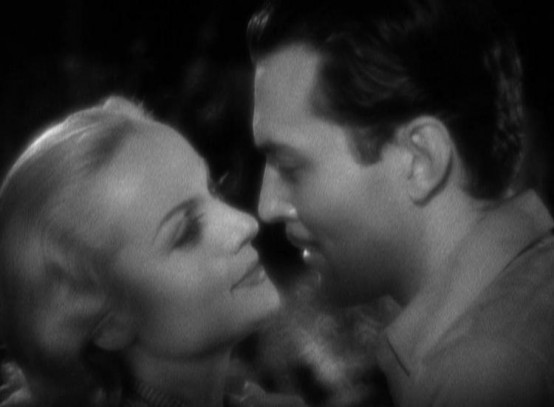 This starts out as a Carole Lombard movie, but once Charles Laughton comes along he crowds out all of the other actors with his bushy mustache, loud suits, and even louder dialogue. But not the loudest. Carole and Kent Taylor are forced to take Laughton’s insults, but eventually a booming voice interrupts his cruelty: “A man talked that way to me, brother, I’d kick his teeth out.” We’re a little more than halfway into White Woman, but Charles Bickford has arrived!
This starts out as a Carole Lombard movie, but once Charles Laughton comes along he crowds out all of the other actors with his bushy mustache, loud suits, and even louder dialogue. But not the loudest. Carole and Kent Taylor are forced to take Laughton’s insults, but eventually a booming voice interrupts his cruelty: “A man talked that way to me, brother, I’d kick his teeth out.” We’re a little more than halfway into White Woman, but Charles Bickford has arrived!
White Woman started out on Broadway as Hangman’s Whip, but lasted there only a little over a week. Paramount bought the story for their new European import, Dorothea Wieck, the star of Mädchen in Uniform (1933). Shortly after Laughton was cast, Wieck was shifted to Cradle Song and Lombard chosen to star in this production. Charles Bickford had just finished work on Cecil B. DeMille’s This Day and Age at the studio when they added him to White Woman.
Paramount shifted the play’s original setting from a West African river to a colonial Malaysian outpost in Southeast Asia, I suppose because the action eventually takes place on a rubber plantation. On one of the islands a widowed white woman, Judith Denning (Lombard), raises eyebrows among upper class whites by remaining in their presence after her husband’s controversial suicide and, making matters worse, shamelessly singing in a cafe frequented by the island natives.
She knows she’s making a deal with the devil when she marries the “King of the River,” wealthy rubber plantation owner Horace H. Prin (Laughton), but Prin’s proposal saves her from being deported by the more traditional elite who have claimed power on the island. Within moments of reaching Prin’s jungle plantation, Judith falls head over heels for overseer David von Elst (Kent Taylor). Prin picks up on the attraction and his wicked sense of humor and twisted values become all the more apparent to her.
David, like the other whites working for Prin, has a past that keeps him exiled and under Prin’s thumb. Among the other overseers are a murderer, a thief, and a drug dealer. David’s crime is cowardice. He deserted the military after natives cut off his partner’s head and tossed it in his window. Prin’s Malaysian rubber plantation offers an escape for criminals and misfits, at the cost of absolute obedience. When one of the whites rebels shortly after Judith’s arrival, he’s reported dead before sundown. The gleeful Prin makes no attempt to distance himself from responsibility.
David’s love for Judith rouses him to action, but as soon as he stands up to Prin, he’s swatted back down. Prin sends him to another part of the plantation, both to show David who’s boss, and to keep him away from his wife. Just as David departs, new boss Ballister (Bickford) makes his boisterous arrival and we can immediately see that he and Prin are going to have a combustible relationship.
Ballister pursues Judith, even after discovering she’s Prin’s wife, but she’s in love with David and finds Ballister barbaric. Ballister and Prin despise one another, though there’s a mutual respect at work between them as well. Neither man can stand softness or, as Prin calls it, mush. When Prin finally pushes his power too far and insults his native workers, they prepare for war. As the drums sound, another head rolls before David’s feet, providing him with an opportunity at redemption on multiple levels.
Lombard looks spectacular and even gets to sing a couple of songs (dubbed by Mona Lowe according to IMDb), but her presence fades the moment Laughton arrives to begin taking this movie over. His Prin is loud and boorish, he drops his aitches and wears suits so loud they transcend black and white. You can almost imagine Laughton’s delight upon discovering that mustache when he was first made up for this part. His Prin is cruel with a twisted sense of humor and a childish desire to always get his way, which, given his position of power, he does. Laughton—and this also goes for Bickford—discards any pretense of subtlety to put the best and worst aspects of his talent on display. It works. The movie belongs to Laughton.
Loud and tough, Bickford bursts upon the scene to present a challenge to Laughton’s character that the softer Kent Taylor could never hope to muster. If this were an MGM movie, and Bickford was Clark Gable, then this brute would walk away with the girl in the end, hormones ultimately winning the day. But Bickford’s chain gang fugitive is only an incrementally better choice than Laughton’s self-made monster, so Lombard sticks with the only sensitive character on board, Kent Taylor’s. Unfortunately, in doing so she largely disappears from White Woman.
From the moment Prin and Ballister first meet it’s like tearing pages off a calendar in anticipation of a top prize fight. They spar verbally throughout, never getting around to fully duking it out, but Bickford manages to one-up Laughton in the end by making an unforgettable departure.
Available on DVD-R as part of the Universal Vault Series. Buy White Woman here on Amazon, with my thanks for purchasing through my affiliate link.






Leave a Reply